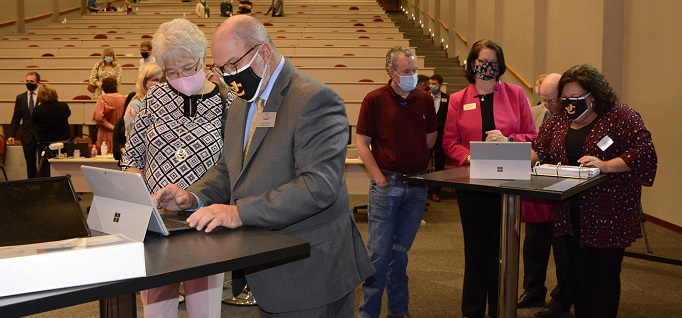Workforce training at your fingertips
By Teresa McCreery
April 13, 2021
Virtual workforce training comes to a Mississippi college
Jones College (JC) is making workforce training more accessible through its new Online Workforce College.
The virtual workforce training developed at Jones is customizable to the business or student’s needs. It includes 700 different courses, including employability skills, team building, health and safety and technical competencies. It also provides proof of industry-required skills, beyond a high school or college degree.
Jones College President Jesse Smith said the OWC is making higher education and workforce training accessible to more people.
“Higher education has to be accessible to everyone because we all need some level of growth or training. Jones can now provide that accessibility for the individual learner and help make our employers more competitive in a global market,” said Smith.
The developer of this unique delivery method of virtual workforce training, Jones College’s Director of Online Workforce College Michael Trest said the goal is to bridge the skills gap by utilizing technology in a cost-effective manner.
“The OWC courses are self-paced and available 24/7 with every course taking about an hour to complete, for only $10,” Trest said.
All of the workforce training courses are aligned with industry standards, by companies who are leaders in their field. JC’s Online Workforce College coordinators work with local businesses to customize training needs for each business or individual. President and CEO of the Mississippi Economic Council, Scott Waller, IOM, said he’s excited about the impact the OWC will have on individuals, businesses and the state’s economy.
“The key for us in Mississippi is to make sure we’re creating opportunities for citizens to learn more skills and the specific skills needed by the companies we have here in the state. We also need to meet the needs of the workforce and create the type of environment from an economic perspective, that allows us to grow jobs, per capita income and really create a successful workforce throughout the state,” Waller said.
Company leaders can access each employee’s training progress and success throughout the process. After each course, a digital badge is earned, displaying the competencies successfully completed, which can also be shared like a digital resume. Trest said the OWC works for individuals or companies with training needs for one person to 1,000 people in 20 different states, with the ability to train everyone.
“We want the OWC to help you reach your goals, monitor success and training progress,” said Trest to the business and industry representatives at the launch of the OWC. “Now, business and industry employees don’t have to travel to access quality training. A small investment provides access to world-class training at your fingertips.”
The state’s 15 community colleges are part of the catalyst that will help change the face of workforce training. A newly created community college consortium will be instrumental in providing OWC training for each community college’s business partners,” said Mississippi Community College Board Executive Director Angela Mayfield.
“Jones College has done something no one else has ever done before and that is to expand the workforce training toolbox to include online, skills-based training. I am impressed!” said Mayfield. “The partnerships across the state, longtime relationships, coupled with their skills and innovative spirit has resulted in the development of this Online Workforce College. Mississippi companies have another tool designed for them, according to their specifications to be more successful.”
Ultimately, the customizable training through short courses will help close the skills gap between what employers need and the skills citizens have, earning individuals’ credentials that could lead to promotions with the enhanced skills, better safety practices and college degrees. Current content areas include industrial training, manufacturing, logistics, employability, soft-skills, workplace safety, basic technology, networking, IT security, coding, and adult education and more.
This article originally appeared here.



